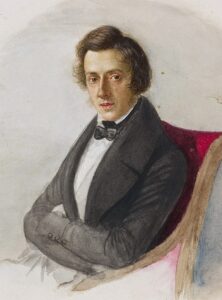Frederic Chopin
1810 – 1849
Considered one of the greatest composers of the Romantic era
Dad came from France and played the violin, mum was a Polish patriot and played the piano. Frederic grew up in Warsaw, close to the Royal Palace and other mansions.
Child prodigy
When Frederic turned 5, his mum started teaching him to play the piano, and a year later he was taught by Wojciech Żywny – a Polish pianist and composer. He soon began playing in noble houses, including for the Russian Grand Duke Konstanty. At the age of 7, his first composition was published in print. He gave his first major public concert when he was 8 years old. After graduating from high school in 1826, he was admitted to the Academy of Music in Warsaw, where he completed a three-year individual study programme.

From 1829, the young man began composing in earnest, falling in love and travelling abroad. During the Polish November Uprising against Russian rule in 1830, Chopin was in Germany. The uprising affected him deeply, he wrote revolutionary compositions and travelled on to Paris, never to return to Poland.
Paris
In Paris, he composed but was not fond of organising concerts. Instead, he started teaching. In the meantime, he contracted tuberculosis. In 1837, he began a relationship with George Sand, a writer six years his senior, whose love novels were banned by the Catholic Church. They travelled together to Majorca and often stayed at Sand’s estate in France, but the relationship ended after nine years, after which Chopin became depressed and stopped composing. At the same time, his illness worsened considerably and in 1849 he died.
Relationship with George Sand
The relationship with George Sand has been the subject of much speculation that I am unable to relate to. Sand had an outgoing character and was in many ways Chopin’s opposite. She wore men’s clothes, smoked cigars, had a dominant character and a strong feminine sexuality that she lived out without hiding it.
Body in Paris, heart in Warsaw
Chopin was buried in Paris, but asked for his heart to be transported to Warsaw, where it was stored in a glass spirit jar for a number of years. In 1880, it was embedded in a column in the Church of the Holy Cross in Warsaw, directly opposite the statue of Copernicus.
National Polish composer
Today, Chopin is revered as the epitome of Polishness. He has several museums, an institute that promotes his works, international Chopin competitions are organised, and every Sunday in the summer there is a Chopin concert in Lazienki Park in Warsaw.
Please send an email to m@hardenfelt.pl if you would like an English-speaking tour guide to show you the most important places in Warsaw.


